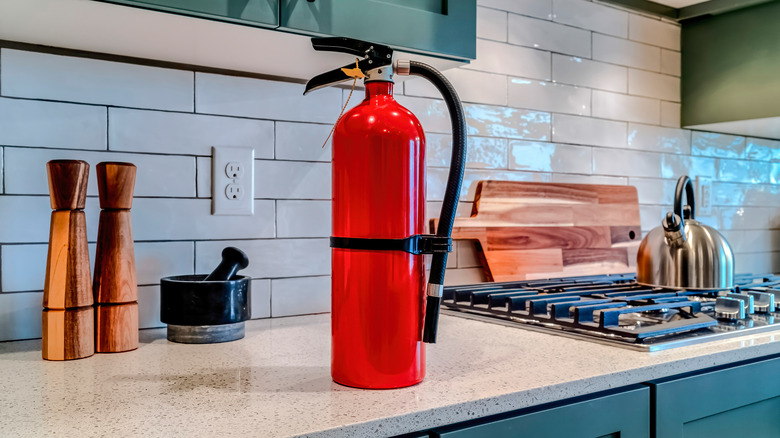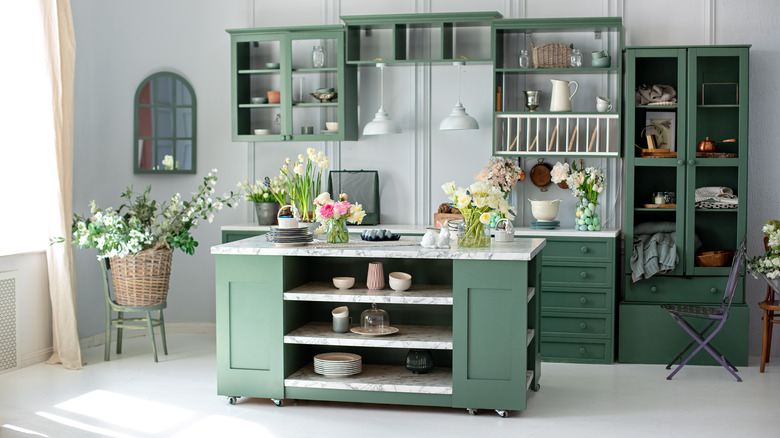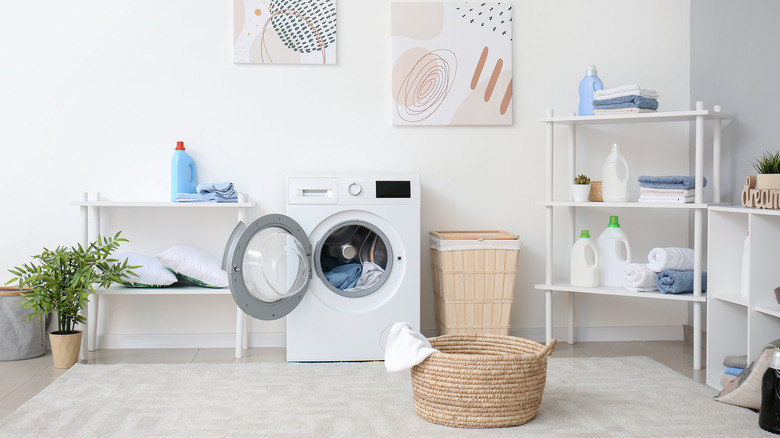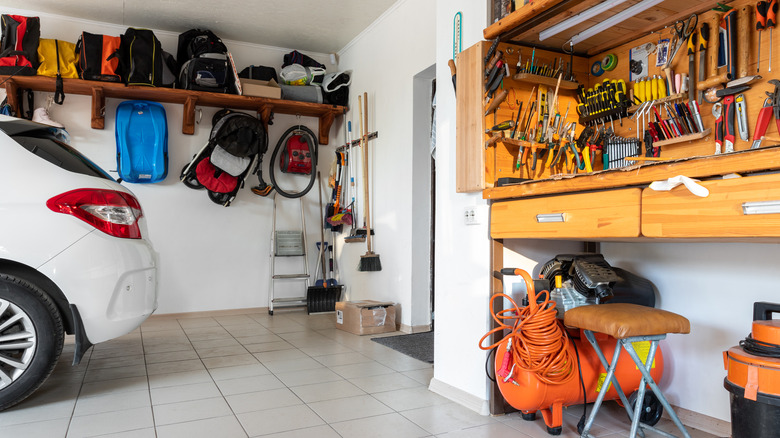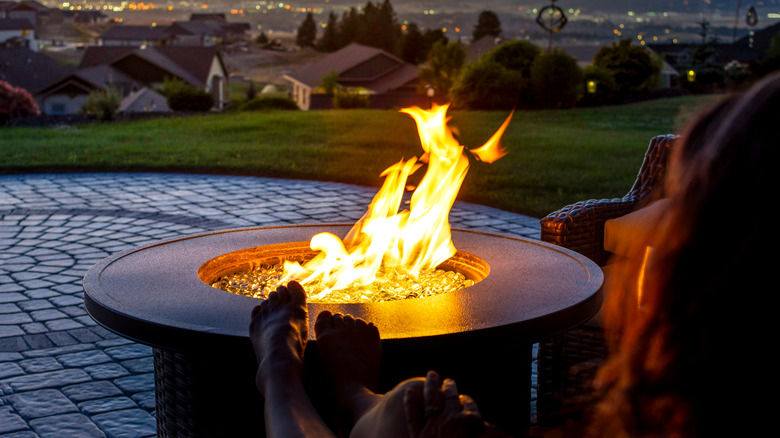The 5 Best Places In Your Home To Store Your Fire Extinguisher
Keeping your home safe is essential — and having a fire extinguisher around is one surefire way to prepare for an emergency. After all, this handy apparatus can help snuff out flames before they take over your entire house. To keep them working correctly, ensure they're always in an accessible location and in good working condition. You'll also want to dispose of an expired fire extinguisher and make sure to swap out those that need to be replaced. Additionally, how you store them is more crucial than you may think.
For starters, fire extinguishers should never be left on the floor because they are susceptible to damage. Instead, you should mount them on a wall. Doing so will not only allow you to grab them quickly in an emergency, but it will also help keep them out of the reach of young children. When deciding where to place your extinguishers, know that certain rooms are more susceptible to fires, and you'll want to put them there. However, you should keep at least one on every floor of your house, per Impact Fire. In case of an emergency, you don't want to be running around looking for where it is.
1. Kitchen
The kitchen is perhaps the best place to keep a fire extinguisher nearby, and it's easy to see why. While there are many different ways a fire could start here, grease on the stove is the most dangerous. Plus, a grease fire will only worsen if you attempt to put it out with water, making an extinguisher necessary to have on hand.
Fires can also start in ovens, microwaves, and toasters. Since the kitchen has so many potential hazards, it's better to play it safe and keep a fire extinguisher nearby instead of searching for one all over the house. Inevitably, when you waste time looking for one, flames and smoke can spread throughout your home.
Home Storage Solutions 101 explains that, contrary to what you may think, the best place to store a fire extinguisher is not next to your stove. Instead, keep it away from any appliances or just outside the kitchen. Not to mention, if it's placed next to an appliance that becomes the source of the fire, the last thing you want to do is reach through the flames to grab the extinguisher.
2. Laundry room
A laundry room is another space that's susceptible to house fires. Indeed, keeping an extinguisher in this room is worthwhile because dryers use heat to dry your clothes and can develop a buildup of lint over time. If you aren't diligently discarding this fluff from your lint trap, the tiny fibers can reach the heating element, sparking and starting a fire, according to The Dryerbox.
To prevent this from happening, make sure to clean out your lint trap after every load and routinely inspect and clean the dryer vent and exhaust duct. However, it's unlikely yours will always be perfectly clean since lint comes from the tiny fibers of clothing. Regardless, having an extinguisher nearby and ready to go is essential just in case that lint ever causes a fire. According to the National Fire Protection Association, local stations responded to more than 13,000 blazes per year from 2014 to 2018 that started from dryers.
While you might be apprehensive about potentially replacing an appliance, doing so is much easier — and inexpensive — than renovating an entire room or floor of your home.
3. Near bedrooms
Keeping an extinguisher in or near your bedrooms can save lives. While a fire may not start in these sleeping quarters, it can quickly travel to them. Start Sleeping explains that about half of all home fires that result in deaths occur at night when people are asleep. As such, having an extinguisher in these rooms can keep the flames at bay while help is on the way.
Did you know many fires start in bedrooms due to homeowners who smoke indoors or light candles? These activities put you at risk of the flames reaching flammable curtains or furniture. In fact, between 2014 and 2018, fire departments responded to an average of around 7,600 candle-started blazes per year (via the National Fire Protection Association). Of those, 60% happened because the candle was too close to flammable material and another 16% took place because it was left unattended.
Bottom line: Having a fire extinguisher in bedrooms or in nearby hallways can keep your family safe.
4. Garage
Your garage is another area where a fire could easily start. Garages serve as storage for plenty of essentials, from cars and bikes to gasoline and paint thinners. Because these items don't have a place in the home, they're typically housed in this space. However, materials like gasoline and paint thinners can be what ignite a house fire.
Plus, if paint thinner is not disposed of properly and you have rags soaked in it, they can quickly ignite when exposed to oxygen and in hot weather (via Mutual of Enumclaw Insurance). Mixing the ignition of a fire with fuel will cause it to grow.
However, keeping a fire extinguisher in your garage can stop any blaze before it causes any significant damage. Life Safety Service and Supply recommends placing yours near the garage door. Doing this will prevent you from walking back into the garage and possibly through the flames to reach it.
5. Patio and grill
Charcoal and electric grills can be dangerous, especially when you place them up against the outside of your home. And while fire pits are also popular to use on a backyard patio, the flames generated from these open-air apparatuses can also quickly grow too high. If they get out of hand, you need to have an extinguisher nearby. But since these fires originate outside, you should use a different type of extinguisher.
Take A Yard explains that a Class K fire extinguisher is best for grills because of the grease and oils that are produced when cooking. Although, if you have a fire pit, a Class A or B will be better at putting out the wood and any fuel, respectively, according to Porch. Keeping your fire extinguisher outside is not recommended because the elements can damage it, causing it not to work as effectively. It shouldn't be more than 30 feet from your fire pit or grill. To keep it nearby and protected, place it just inside your home.
